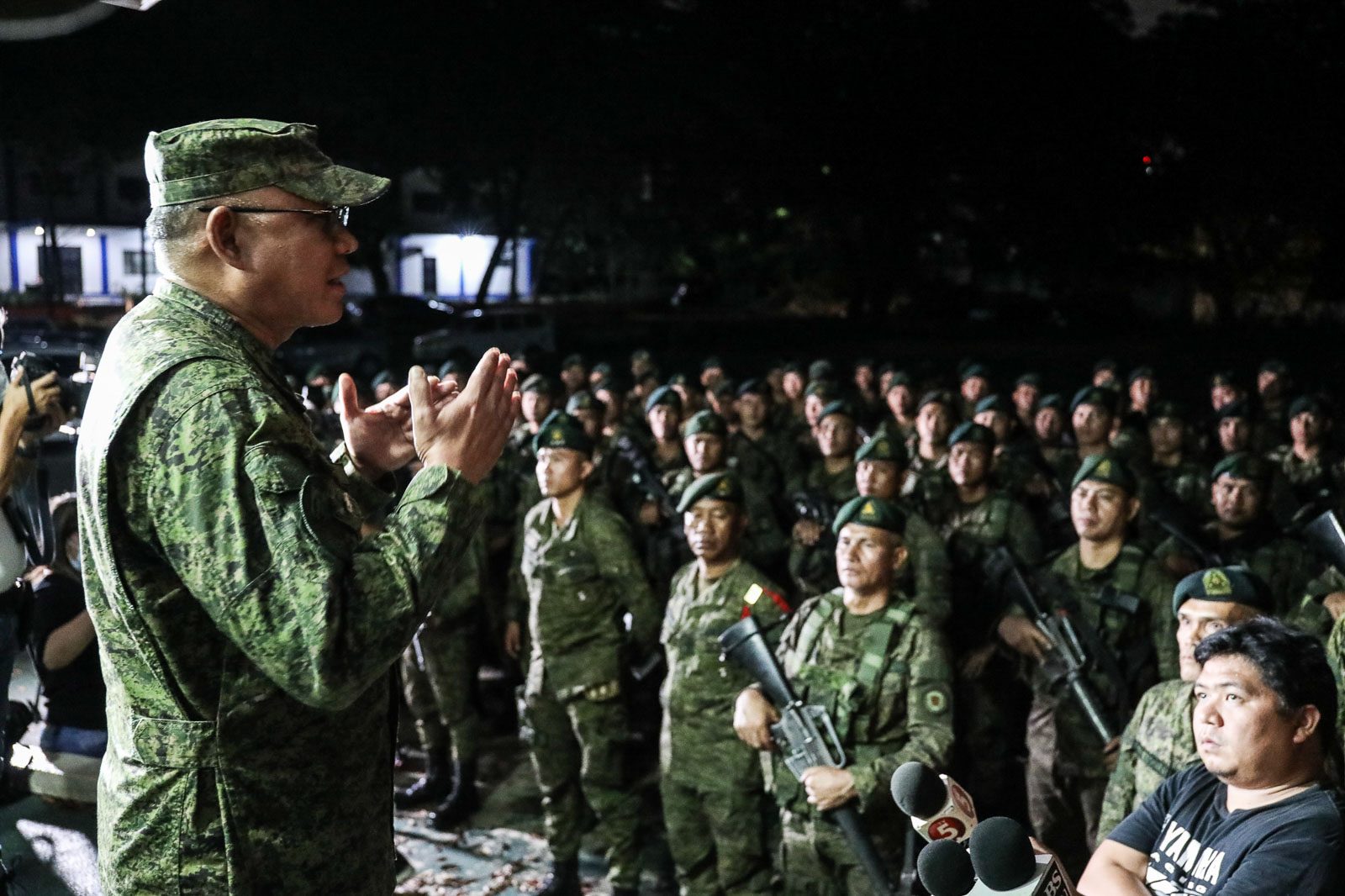SUMMARY
This is AI generated summarization, which may have errors. For context, always refer to the full article.

MANILA, Philippines – In fatigues, they roam the streets in military trucks fitted with loudspeakers, reminding residents in market places, basketball courts, or even near cockpits to head home unless they have legitimate reasons to be outdoors.
From camps and airports, they deploy helicopters, trucks, and armored vehicles to transport people, food, and medical supplies needed by health workers and communities as the country battles the coronavirus pandemic. They drive buses lent by companies for frontline services.
“Our focus now is on the logistical side of the efforts against the COVID-19 pandemic. Delivery of personal protective equipment (PPE), food, and medical equipment,” Armed Forces of the Philippines deputy chief of staff for civil military operations Brigadier General Edgardo de Leon told Rappler on Wednesday, April 22.
On Wednesday morning, for example, a Philippine Air Force C-130 flight arrived in Manila from Shenzhen, China, delivering 4,500 kg of laboratory equipment for coronavirus testing.
Philippine Navy ships BRP Ramon Alcaraz and BRP Davao del Sur are on the way from Oman to India to pick up PPE for delivery to the Philippines. Another Navy ship, the BRP Bacolod City, pulled out of Sangley Point in Cavite City on Tuesday, April 21, to pick up more than 23,000 boxes of PPE from Xiamen, China.
In case President Rodrigo Duterte orders a stricter, “martial law-like” enforcement of lockdown measures to quell the coronavirus pandemic, the Armed Forces of the Philippines (AFP) will remain secondary to the Philippine National Police (PNP) in its implementation, said De Leon.
The lockdown is scheduled to end on April 30, though all indications show it will be extended at least in Metro Manila.
Spooking public
The public was spooked after Duterte’s announcement because of a leaked Air Force memorandum advising troops to “prepare for strict implementation of extensive enhanced community quarantine where the AFP will be the overall in-charge along roads and highways.” The military was quick to explain that it was normal for the organization to prepare for any “martial law-like” deployment.
De Leon said the police continues to be the lead enforcer during the lockdown. “The PNP is the one making the preparations so far…. No changes in the AFP involvement. The AFP shall remain in the support role,” he added.
In Metro Manila, which has one of the highest concentrations of COVID-19 cases in the country, some 2,500 military troops have been deployed to checkpoints and areas where local executives requested their presence to augment the police force.
Others have also been assigned to drive buses lent by private companies to give free rides to essential workers, and to help distribute relief goods, De Leon added.
The military may deploy additional troops in case the President orders heightened lockdown measures, said AFP Joint Task Force National Capital Region chief Brigadier General Alex Luna.
“I can deploy another 2,000 [troops] but I don’t want to ‘full blast’ all of these because then I wouldn’t have back-up…so we control the deployment of personnel,” Luna said in an interview on Monday, April 20.
“But definitely, our objective is to discipline the people, and to have them stay home, so if we have to release all the 2,000 [troops], we will do that, if that’s what it will take to keep them home,” Luna added.
800 reservists
The AFP has also deployed some 800 reservists to help enforce peace and order in certain parts of Metro Manila, upon the request of local governments.
Around 500 military reservists were sent to Quezon City and Manila on Monday, while 300 others were deployed to Pasay City, Parañaque City, and Pateros on Tuesday, said AFP spokesperson Brigadier General Edgard Arevalo.
The reservists were in complete military uniform and were under the command of regular members of the AFP, the marine general added.
Luna noted that Metro Manila residents are still found loitering at basketball courts or heading to cockfights, which are “inexcusable” during the lockdown.
Duterte on April 16 said in a televised speech that he would order the military and police to “take over” if people continue to violate lockdown rules – “like martial law.”
A day later, Arevalo said the military is ready to work with the PNP to “establish discipline and order” if the President orders it.
No to total lockdown
On Thursday, April 23, Duterte is expected to announce the government’s policy for when the lockdown of “enhanced community quarantine” of Luzon ends on April 30.
Among health policy experts consulted by Duterte, none had recommended a “total lockdown,” and among options they presented were to maintain, modify, partially, or totally lift the existing lockdown. However, Duterte is free to decide beyond these options, Malacañang said.
Metro Manila went on lockdown on March 15, and the rest of Luzon on March 17. Originally meant to end on April 14, the lockdown was extended until April 30 as coronavirus cases continued to rise.
Experts from the University of the Philippines said the lockdown helped stifle the spread of the virus, and that it may surge when the lockdown is lifted.
As of Wednesday, the Philippines has recorded 6,710 confirmed cases of COVID-19, with 446 deaths and 693 recoveries. – Rappler.com
Add a comment
How does this make you feel?
There are no comments yet. Add your comment to start the conversation.